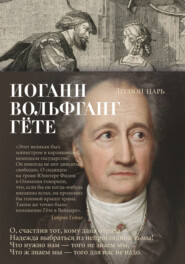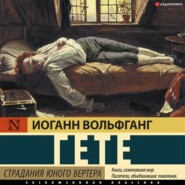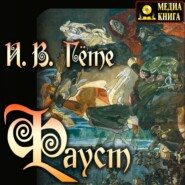По всем вопросам обращайтесь на: info@litportal.ru
(©) 2003-2024.
✖
Wilhelm Meister's Apprenticeship and Travels, Vol. I (of 2)
Настройки чтения
Размер шрифта
Высота строк
Поля
At this instant somebody came rushing in, and cried, "The Ghost! the Ghost!"
Wilhelm had not once had time all day to think of the Ghost, and whether it would come or not. His anxiety on that head was at length removed, and now some strange assistant was to be expected. The stage-manager came in, inquiring after various matters: Wilhelm had not time to ask about the Ghost; he hastened to present himself before the throne, where King and Queen, surrounded with their court, were already glancing in all the splendors of royalty, and waiting till the scene in front of them should be concluded. He caught the last words of Horatio, who was speaking of the Ghost, in extreme confusion, and seemed to have almost forgotten his part.
The intermediate curtain went aloft, and Hamlet saw the crowded house before him. Horatio, having spoken his address, and been dismissed by the King, pressed through to Hamlet; and, as if presenting himself to the Prince, he said, "The Devil is in harness: he has put us all in fright."
In the mean while, two men of large stature, in white cloaks and capouches, were observed standing in the side-scenes. Our friend, in the distraction, embarrassment, and hurry of the moment, had failed in the first soliloquy; at least, such was his own opinion, though loud plaudits had attended his exit. Accordingly, he made his next entrance in no pleasant mood, with the dreary wintry feeling of dramatic condemnation. Yet he girded up his mind, and spoke that appropriate passage on the "rouse and wassail," the "heavy-headed revel" of the Danes, with suitable indifference; he had, like the audience, in thinking of it, quite forgotten the Ghost; and he started, in real terror, when Horatio cried out, "Look, my lord! it comes!" He whirled violently round; and the tall, noble figure, the low, inaudible tread, the light movement in the heavy-looking armor, made such an impression on him, that he stood as if transformed to stone, and could utter only in a half-voice his "Angels and ministers of grace defend us!" He glared at the form, drew a deep breathing once or twice, and pronounced his address to the Ghost in a manner so confused, so broken, so constrained, that the highest art could not have hit the mark so well.
His translation of this passage now stood him in good stead. He had kept very close to the original, in which the arrangement of the words appeared to him expressive of a mind confounded, terrified, and seized with horror: —
"'Be thou a spirit of health, or goblin damn'd,
Bring with thee airs from heaven, or blasts from hell,
Be thy intents wicked, or charitable,
Thou com'st in such a questionable shape,
That I will speak to thee: I'll call thee Hamlet,
King, father, royal Dane: oh, answer me!'"
A deep effect was visible in the audience. The Ghost beckoned, the Prince followed him amid the loudest plaudits.
The scene changed: and, when the two had re-appeared, the Ghost, on a sudden, stopped, and turned round; by which means Hamlet came to be a little too close upon it. With a longing curiosity, he looked in at the lowered visor; but except two deep-lying eyes, and a well-formed nose, he could discern nothing. Gazing timidly, he stood before the Ghost; but when the first tones issued from the helmet, and a somewhat hoarse, yet deep and penetrating, voice, pronounced the words, "I am thy father's spirit," Wilhelm, shuddering, started back some paces; and the audience shuddered with him. Each imagined that he knew the voice: Wilhelm thought he noticed in it some resemblance to his father's. These strange emotions and remembrances, the curiosity he felt about discovering his secret friend, the anxiety about offending him, even the theatric impropriety of coming too near him in the present situation, all this affected Wilhelm with powerful and conflicting impulses. During the long speech of the Ghost, he changed his place so frequently, he seemed so unsettled and perplexed, so attentive and so absent-minded, that his acting caused a universal admiration, as the Spirit caused a universal horror. The latter spoke with a feeling of melancholy anger, rather than of sorrow; but of an anger spiritual, slow, and inexhaustible. It was the mistemper of a noble soul, that is severed from all earthly things, and yet devoted to unbounded woe. At last he vanished, but in a curious manner; for a thin, gray, transparent gauze arose from the place of descent, like a vapor, spread itself over him, and sank along with him.
Hamlet's friends now entered, and swore upon the sword. Old Truepenny, in the mean time, was so busy under ground, that, wherever they might take their station, he was sure to call out right beneath them, "Swear!" and they started, as if the soil had taken fire below them, and hastened to another spot. On each of these occasions, too, a little flame pierced through at the place where they were standing. The whole produced on the spectators a profound impression.
After this, the play proceeded calmly on its course: nothing failed; all prospered; the audience manifested their contentment, and the actors seemed to rise in heart and spirits every scene.
CHAPTER XII
The curtain fell, and rapturous applauses sounded out of every corner of the house. The four princely corpses sprang aloft, and embraced each other. Polonius and Ophelia likewise issued from their graves, and listened with extreme satisfaction, as Horatio, who had stepped before the curtain to announce the following play, was welcomed with the most thundering plaudits. The people would not hear of any other play, but violently required the repetition of the present.
"We have won," cried Serlo, "and so not another reasonable word this night! Every thing depends on the first impression: we should never take it ill of any actor, that, on occasion of his first appearance, he is provident, and even self-willed."
The box-keeper came, and delivered him a heavy sum. "We have made a good beginning," cried the manager, "and prejudice itself will now be on our side. But where is the supper you promised us? To-night we may be allowed to relish it a little."
It had been agreed that all the party were to stay together in their stage-dresses, and enjoy a little feast among themselves. Wilhelm had engaged to have the place in readiness, and Frau Melina to provide the victuals.
A room, which commonly was occupied by scene-painters, had accordingly been polished up as well as possible: our friends had hung it round with little decorations, and so decked and trimmed it, that it looked half like a garden, half like a colonnade. On entering it, the company were dazzled with the glitter of a multitude of lights, which, across the vapors of the sweetest and most copious perfumes, spread a stately splendor over a well-decorated and well-furnished table. These preparations were hailed with joyful interjections by the party; all took their places with a certain genuine dignity; it seemed as if some royal family had met together in the Kingdom of the Shades. Wilhelm sat between Aurelia and the Frau Melina; Serlo between Philina and Elmira; nobody was discontented with himself or with his place.
Our two theatric amateurs, who had from the first been present, now increased the pleasure of the meeting. While the exhibition was proceeding, they had several times stepped round, and come upon the stage, expressing, in the warmest terms, the delight which they and the audience felt. They now descended to particulars, and each was richly rewarded for his efforts.
With boundless animation, the company extolled man after man, and passage after passage. To the prompter, who had modestly sat down at the bottom of the table, they gave a liberal commendation for his "rugged Pyrrhus;" the fencing of Hamlet and Laertes was beyond all praise; Ophelia's mourning had been inexpressibly exalted and affecting; of Polonius they would not trust themselves to speak.
Every individual present heard himself commended through the rest and by them, nor was the absent Ghost defrauded of his share of praise and admiration. He had played the part, it was asserted, with a very happy voice, and in a lofty style; but what surprised them most, was the information which he seemed to have about their own affairs. He entirely resembled the painted figure, as if he had sat to the painter of it; and the two amateurs described, in glowing language, how awful it had looked when the spirit entered near the picture, and stepped across before his own image. Truth and error, they declared, had been commingled in the strangest manner: they had felt as if the Queen really did not see the Ghost. And Frau Melina was especially commended, because on this occasion she had gazed upwards at the picture, while Hamlet was pointing downwards at the Spectre.
Inquiry was now made how the apparition could have entered. The stage-manager reported that a back-door, usually blocked up by decorations, had that evening, as the Gothic hall was occupied, been opened; that two large figures in white cloaks and hoods, one of whom was not to be distinguished from the other, had entered by this passage; and by the same, it was likely, they had issued when the third act was over.
Serlo praised the Ghost for one merit, – that he had not whined and lamented like a tailor; nay, to animate his son, had even introduced a passage at the end, which more beseemed such a hero. Wilhelm had kept it in memory: he promised to insert it in his manuscript.
Amid the pleasures of the entertainment, it had not been noticed that the children and the harper were absent. Erelong they made their entrance, and were blithely welcomed by the company. They came in together, very strangely decked: Felix was beating a triangle, Mignon a tambourine; the old man had his large harp hung round his neck, and was playing on it whilst he carried it before him. They marched round and round the table, and sang a multitude of songs. Eatables were handed them; and the guests seemed to think they could not do a greater kindness to the children, than by giving them as much sweet wine as they chose to have. For the company themselves had not by any means neglected a stock of savory flasks, presented by the two amateurs, which had arrived that evening in baskets. The children tripped about, and sang: Mignon, in particular, was frolicsome beyond all wont. She beat the tambourine with the greatest liveliness and grace: now, with her finger pressed against the parchment, she hummed across it swiftly to and fro; now rattled on it with her knuckles, now with the back of her hand; nay, sometimes, with alternating rhythm, she struck it first against her knee and then against her head; and anon twirling it in her hand, she made the shells jingle by themselves; and thus, from the simplest instrument, elicited a great variety of tones. After she and Felix had long rioted about, they sat down upon an elbow-chair which was standing empty at the table, exactly opposite to Wilhelm.
"Keep out of the chair!" cried Serlo: "it is waiting for the Ghost, I think; and, when he comes, it will be worse for you."
"I do not fear him," answered Mignon: "if he come, we can rise. He is my uncle, and will not harm me." To those who did not know that her reputed father had been named the Great Devil, this speech was unintelligible.
The party looked at one another: they were more and more confirmed in their suspicion that the manager was in the secret of the Ghost. They talked and tippled, and the girls from time to time cast timid glances towards the door.
The children, who, sitting in the big chair, looked from over the table but like puppets in their box, did actually at length start a little drama in the style of Punch. The screeching tone of these people Mignon imitated very well; and Felix and she began to knock their heads together, and against the edges of the table, in such a way as only wooden puppets could endure. Mignon, in particular, grew frantic with gayety: the company, much as they had laughed at her at first, were in fine obliged to curb her. But persuasion was of small avail; for she now sprang up, and raved, and shook her tambourine, and capered round the table. With her hair flying out behind her, with her head thrown back, and her limbs, as it were, cast into the air, she seemed like one of those antique Mænads, whose wild and all but impossible positions still, on classic monuments, often strike us with amazement.
Incited by the talents and the uproar of the children, each endeavored to contribute something to the entertainment of the night. The girls sung several canons; Laertes whistled in the manner of a nightingale; and the Pedant gave a symphony pianissimo upon the Jew's-harp. Meanwhile the youths and damsels, who sat near each other, had begun a great variety of games; in which, as the hands often crossed and met, some pairs were favored with a transient squeeze, the emblem of a hopeful kindness. Madam Melina in particular seemed scarcely to conceal a decided tenderness for Wilhelm. It was late; and Aurelia, perhaps the only one retaining self-possession in the party, now stood up, and signified that it was time to go.
By way of termination, Serlo gave a firework, or what resembled one; for he could imitate the sound of crackers, rockets, and fire wheels, with his mouth, in a style of nearly inconceivable correctness. You had only to shut your eyes, and the deception was complete. In the mean time, they had all risen: the men gave their arms to the women to escort them home. Wilhelm was walking last with Aurelia. The stage-manager met him on the stairs, and said to him, "Here is the veil our Ghost vanished in; it was hanging fixed to the place where he sank; we found it this moment." – "A curious relic!" said our friend, and took it with him.
At this instant his left arm was laid hold of, and he felt a smart twinge of pain in it. Mignon had hid herself in the place: she had seized him, and bit his arm. She rushed past him, down stairs, and disappeared.
On reaching the open air, almost all of them discovered that they had drunk too liberally. They glided asunder without taking leave.
The instant Wilhelm gained his room, he stripped, and, extinguishing his candle, hastened into bed. Sleep was overpowering him without delay, when a noise, that seemed to issue from behind the stove, aroused him. In the eye of his heated fancy, the image of the harnessed King was hovering there: he sat up that he might address the Spectre; but he felt himself encircled with soft arms, and his mouth was shut with kisses, which he had not force to push away.
CHAPTER XIII
Next morning Wilhelm started up with an unpleasant feeling, and found himself alone. His head was still dim with the tumult, which he had not yet entirely slept off; and the recollection of his nightly visitant disquieted his mind. His first suspicion lighted on Philina; but, on second thoughts, he conceived that it could not have been she. He sprang out of bed: and, while putting on his clothes, he noticed that the door, which commonly he used to bolt, was now ajar; though whether he had shut it on the previous night, or not, he could not recollect.
But what surprised him most was the Spirit's veil, which he found lying on his bed. Having brought it up with him, he had most probably thrown it there himself. It was a gray gauze: on the hem of it he noticed an inscription broidered in dark letters. He unfolded it, and read the words, "For the first and the last time! Flee, Youth! Flee!" He was struck with it, and knew not what to think or say.
At this moment Mignon entered with his breakfast. The aspect of the child astonished Wilhelm, we may almost say frightened him. She appeared to have grown taller over night: she entered with a stately, noble air, and looked him in the face so earnestly, that he could not endure her glances. She did not touch him, as at other times, when, for morning salutation, she would press his hand, or kiss his cheek, his lips, his arm, or shoulder; but, having put his things in order, she retired in silence.
The appointed time of a first rehearsal now arrived: our friends assembled, all of them entirely out of tune from yesternight's debauch. Wilhelm roused himself as much as possible, that he might not at the very outset violate the principles he had preached so lately with such emphasis. His practice in the matter helped him through; for practice and habit must, in every art, fill up the voids which genius and temper in their fluctuations will so often leave.
But, in the present case, our friends had especial reason to admit the truth of the remark, that no one should begin with a festivity any situation that is meant to last, particularly that is meant to be a trade, a mode of living. Festivities are fit for what is happily concluded: at the commencement, they but waste the force and zeal which should inspire us in the struggle, and support us through a long-continued labor. Of all festivities, the marriage festival appears the most unsuitable: calmness, humility, and silent hope befit no ceremony more than this.
So passed the day, which to Wilhelm seemed the most insipid he had ever spent. Instead of their accustomed conversation in the evening, the company began to yawn: the interest of Hamlet was exhausted; they rather felt it disagreeable than otherwise that the play was to be repeated next night. Wilhelm showed the veil which the royal Dane had left: it was to be inferred from this, that he would not come again. Serlo was of that opinion; he appeared to be deep in the secrets of the Ghost: but, on the other hand, the inscription, "Flee, youth! Flee!" seemed inconsistent with the rest. How could Serlo be in league with any one whose aim it was to take away the finest actor of his troop?
It had now become a matter of necessity to confer on Boisterous the Ghost's part, and on the Pedant that of the King. Both declared that they had studied these sufficiently: nor was it wonderful; for in such a number of rehearsals, and so copious a treatment of the subject, all of them had grown familiar with it: each could have exchanged his part with any other. Yet they rehearsed a little here and there, and prepared the new adventurers, as fully as the hurry would admit. When the company was breaking up at a pretty late hour, Philina softly whispered Wilhelm as she passed, "I must have my slippers back: thou wilt not bolt the door?" These words excited some perplexity in Wilhelm, when he reached his chamber; they strengthened the suspicion that Philina was the secret visitant: and we ourselves are forced to coincide with this idea; particularly as the causes, which awakened in our friend another and a stranger supposition, cannot be disclosed. He kept walking up and down his chamber in no quiet frame: his door was actually not yet bolted.
On a sudden Mignon rushed into the room, laid hold of him, and cried, "Master! save the house! It is on fire!" Wilhelm sprang through the door, and a strong smoke came rushing down upon him from the upper story. On the street he heard the cry of fire; and the harper, with his instrument in his hand, came down-stairs breathless through the smoke. Aurelia hurried out of her chamber, and threw little Felix into Wilhelm's arms.
"Save the child!" cried she, "and we will mind the rest."
Wilhelm did not look upon the danger as so great: his first thought was, to penetrate to the source of the fire, and try to stifle it before it reached a head. He gave Felix to the harper; commanding him to hasten down the stone stairs, which led across a little garden-vault out into the garden, and to wait with the children in the open air. Mignon took a light to show the way. He begged Aurelia to secure her things there also. He himself pierced upwards through the smoke, but it was in vain that he exposed himself to such danger. The flame appeared to issue from a neighboring house; it had already caught the wooden floor and staircase: some others, who had hastened to his help, were suffering like himself from fire and vapor. Yet he kept inciting them; he called for water; he conjured them to dispute every inch with the flame, and promised to abide by them to the last. At this instant, Mignon came springing up, and cried. "Master! save thy Felix! The old man is mad! He is killing him." Scarcely knowing what he did, Wilhelm darted down stairs; and Mignon followed close behind him.
On the last steps, which led into the garden-vault, he paused with horror. Some heaps of fire-wood branches, and large masses of straw, which had been stowed in the place, were burning with a clear flame; Felix was lying on the ground, and screaming; the harper stood aside, holding down his head, and leaned against the wall. "Unhappy creature! what is this?" said Wilhelm. The old man spoke not; Mignon lifted Felix, and carried him with difficulty to the garden; while Wilhelm strove to pull the fire asunder and extinguish it, but only by his efforts made the flame more violent. At last he, too, was forced to flee into the garden, with his hair and his eyelashes burned; tearing the harper with him through the conflagration, who, with singed beard, unwillingly accompanied him.
Wilhelm hastened instantly to seek the children. He found them on the threshold of a summer-house at some distance: Mignon was trying every effort to pacify her comrade. Wilhelm took him on his knee: he questioned him, felt him, but could obtain no satisfactory account from either him or Mignon.
Meanwhile, the fire had fiercely seized on several houses: it was now enlightening all the neighborhood. Wilhelm looked at the child in the red glare of the flames: he could find no wound, no blood, no hurt of any kind. He groped over all the little creature's body, but the boy gave no sign of pain: on the contrary, he by degrees grew calm, and began to wonder at the blazing houses, and express his pleasure at the spectacle of beams and rafters burning all in order, like a grand illumination, so beautifully there.
Wilhelm thought not of the clothes or goods he might have lost: he felt deeply how inestimable to him was this pair of human beings, who had just escaped so great a danger. He pressed little Felix to his heart with a new emotion: Mignon, too, he was about to clasp with joyful tenderness; but she softly avoided this: she took him by the hand, and held it fast.
"Master," said she (till the present evening she had hardly ever named him master; at first she used to name him sir, and afterwards to call him father), – "Master! we have escaped an awful danger: thy Felix was on the point of death."

















